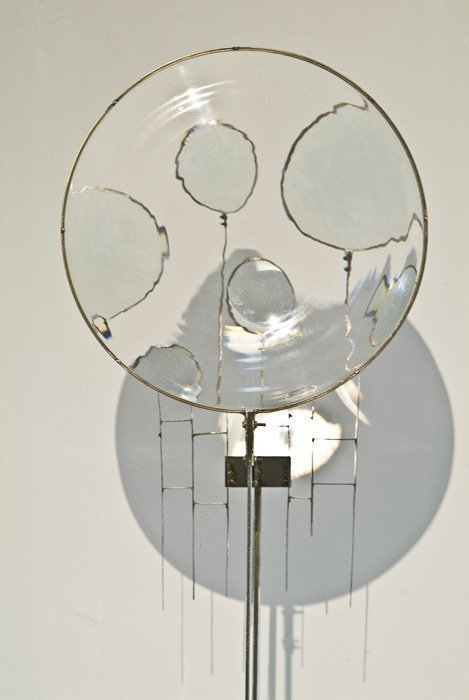George Zongolopoulos (1903-2004 Athens, Greece).
He studied sculpture in the Athens school of Fine Arts with T. Thomopoulos as his teacher (1924-1930). In 1937 he travels to Paris where he studies and familiarizes himself with the work of Ch. Despiau. He studies works of Romanesque, Gothic and contemporary sculpture.
Between 1926 and 1927, he worked in the Department of Restoration of Ancient and Byzantine Monuments for the Ministry of Education. Nevertheless, his interest was not restricted to sculpture. On the contrary, he also engaged in painting and architecture. He worked in the Architectural Department of the Ministry of Education from 1930 to 1940. In that period he designed and built school buildings and churches. In that same period he met and later on married (1936) the painter Eleni Paschalidou.
In the years 1949 and 1950 he worked in the atelier of the sculptor Marcel Gimond in Paris with a scholarship granted by the French Government.rom 1952 to 1953, after having been granted a scholarship by the Greek State Scholarships Foundation, he went to Italy where he studied bronze-casting techniques(Fonderia Nicci, Rome and Fonderia Domeniccini, Pistoia). He studied the sculpture of the renaissance in Florence and Padova, as well as the work of Michelangelo, Pisano, Donatello, Manzoni, Manzu, Marini, Pomodoro and the Etruscan Art.
He has been an active member of such groups as ‘Techni’, the Union of Free Artists, the Association of Free Artists, the Association of Greek Artists, ‘Stathmi’, ‘Tomi’ and the Group for Communication and Education in Art and has taken part in their exhibitions and meetings.
In 1936 his works appeared for the first time in a gallery in Athens. Since then he has held a considerable number of solo exhibitions, participated in group exhibitions and received several distinctions not only in Greece but all over the world. He has had many award winning competition entries and commissions.
He has been a member of the select committee of the Greek State Scholarships foundation with the aim of facilitating the studies of sculpture scholars abroad (1957-1959).
Many of his works belong to private collections and Foundations in Greece and all over the world or adorn public places, buildings and squares. Some of his most noted works in public places in Greece are, the Monument to the Heroines of Zalongos (1954-1960), the Monument to the Fallen in the Municipality of Nikaia, (1955), the Cor-ten sculpture outside the International Fair Grounds in Thessaloniki (1966), the Monument to the Cypriot student Kyriakos Matsis in the Aristotle University of Thessaloniki (1967), ‘Diaphragm’ Ethniki Asfalistiki Building (1973), ‘Olive tree’, Alpha Bank in N. Psychiko (1974), ‘Buckler’, European Cultural Center, Delphi (1989), ‘Umbrellas’ (1997), Thessaloniki seafront, ‘Umbrellas’ (1998), Kifissias Avenue, Municipality of N.Psychico, ‘Atrium’ (1999), Syntagma Square metro station, ‘Omonia’, Omonia Square, (2001), ‘Olympic Rings’, Athens International Airport (2001) ‘Column’, Athens metro Evangelismos(2001).
He has been a member of the Societé Européene de Culture in Venice since 1956 and sat on the executive council from 1960 to 1988.
In 1975 he took part in a round table discussion on the theme of solitude and communication at the 20th International Meeting in Geneva and in the 2nd International Visual Arts Meeting in the European Cultural Centre in Delphi.
He represented Greece at the Venice Biennale (1940, 1956, 1964, 1993, 1995), the Sao Paolo Biennale, (1957) and the Cairo Biennale (1946). He also participated in Europalia, Brussels (1982), the Contemporary Sculpture Exhibition, in Rodin Museum, Paris (1963), in the Salon de la jeune sculpture in Paris 1968-1975, the exhibitions Grand et jeunes d’aujourd’hui, Paris 1979 -1988 and 1990, Salon de Comparaisons, Paris 1986, Art Athina, 1993 and 1996, the International Sculpture Exhibition in Collioure, France in 1988, in ‘Memories- Regenerations-Quests’, National Art Gallery, Athens, 1985 and many more.
Zongolopoulos was particularly concerned that his sculptures should co-exist harmoniously with their environment so he frequently collaborated with architects. In the last period of his work, since 1972 the element of motion has remained a fundamental feature of a number of his compositions along with the additional water and sound. His basic sculpting material is stainless metal in a variety of forms combined with objects such as lenses, umbrellas, pipes and rods.
The awarding of the hydrokinetic work ‘Umbrellas’ in the competition for the’‘Cour d’Honneur’ and its installation at the European Council Building in Brussels in 1995, has been quite honorary.
In February 2004 the sculptor established the public welfare ‘George Zongolopoulos Foundation’ located in his home- atelier. He died on 11th May of the same year.

